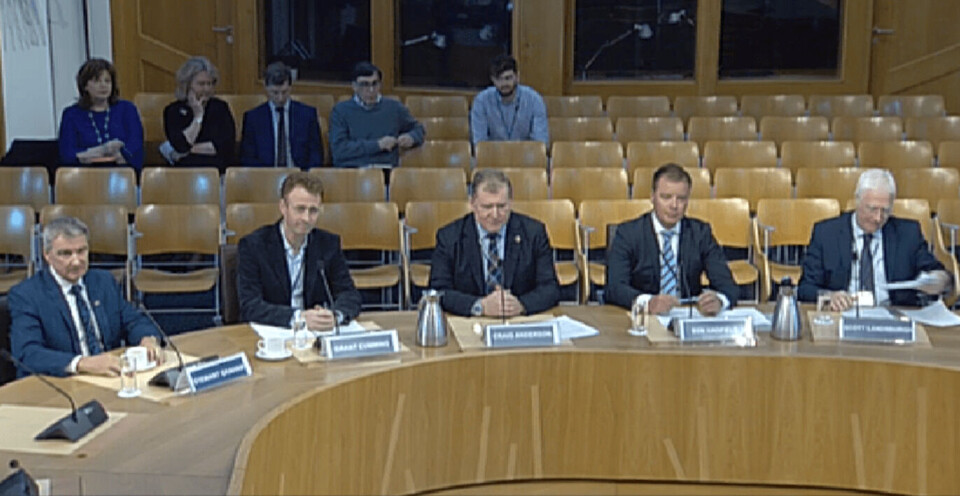
Scottish salmon farmers must raise the bar say MSPs
MSPs who carried out an inquiry into the future of Scottish salmon farming have called for urgent action to improve and enhance the regulation of the industry but have rejected calls for a moratorium on expansion.
In a long-awaited report published today, the Scottish Parliament’s Rural Economy and Connectivity (REC) committee said more effective regulatory standards were needed to ensure that fish health issues are properly managed.
REC committee convener Edward Mountain said that if the industry was to grow it had to prioritise challenges such as the control of sea lice, lowering fish mortality rates and reducing its impact on the environment.
“If the reputation of Scottish salmon as a premium product is to be maintained, Scotland’s salmon farmers must demonstrate responsible and sustainable production methods. Importantly, the committee is strongly of the view that the status quo in terms of regulation and enforcement is not acceptable, and that we need to raise the bar in Scotland by setting enhanced and more effective standards,” said Mountain.
Mandatory reporting
The changes recommended in the report include introducing mandatory and timely reporting of sea lice numbers, fish mortality levels and medicine use.
The MSPs want the figures to be available to regulators and the public a week in arrears, as is the case in Norway. Currently lice figures from Scottish farms are voluntary and are released by the Scottish Salmon Producers Organisation (SSPO) three months after being counted.
MSPs are also recommending that regulators should be given the power to reduce or suspend production at farms with high mortality levels until problems are resolved.
They also say it is essential that waste collection and removal from salmon farms is addressed as a matter of urgency.
Migration routes
Although they acknowledge there is no empirical evidence that lice from fish farms harm wild salmon, the MSPs also say there should be an immediate and proactive shift towards locating new farms away from wild salmon migration routes.
Examining the scope for siting salmon farms in suitable offshore locations should be treated as a high priority.
SSPO chief executive Julie Hesketh-Laird welcomed the report and said the REC committee has recognised the opportunities for well-regulated, sustainable growth in order that the industry can continue to offer economic and social value to Scotland.
Critical phase
“We agree with the committee that there is no evidence that salmon farming should not continue to grow sustainably,” added Hesketh-Laird.
“The Scottish salmon farming sector is at a critical phase of its development and the committee’s recommendation that regulation be improved to keep pace with potential growth is encouraging. The sector is keen to work with Scottish Parliamentary Committees, the Scottish Government, the regulators and other organisations who have interests, or indeed concerns, about salmon farming.
“The health of our fish and the environment we depend on are vital for salmon farming and all SSPO members invest significantly in these areas. Our members produce the world’s most sought-after farmed salmon and are fully aware that, with that, comes the responsibility to ensure world-class fish welfare and environmental standards.
“To that end, the industry is already voluntarily reporting lice levels and is world-leading in publishing survival data on a farm-by-farm basis.

Leading participants
“We are leading participants in the Scottish Government’s 10-year Farmed Fish Health Framework which promotes collaboration between industry, regulators and scientists to underpin long-term improvements in fish health and welfare.
“We intend to continue that work and investment and we welcome involvement in any future regulatory discussion to help us do that and ensure that future changes in farming regulations are robust, inspire confidence in all stakeholders and are practical and workable.
“On the siting of farms, we welcome the committee’s recommendation and the recent move by SEPA (Scottish Environment Protection Agency) to support the development of larger farms. The sector has long called for the flexibility to allow farming in more appropriate locations, while existing farms performing well should be supported to continue in doing so.”
Government response
Under Scottish Government protocol, it is expected to respond to relevant recommendations contained in the REC committee report within two months of its publication.
The form of the response is not specified, but in practice most responses concentrate on the main recommendations of the report which are directed at the Scottish Government.
Committees cannot require the Scottish Government to take action on or accept their recommendations, but there is an expectation that due weight will be given to the conclusions and recommendations agreed.
Read the full report here.























































